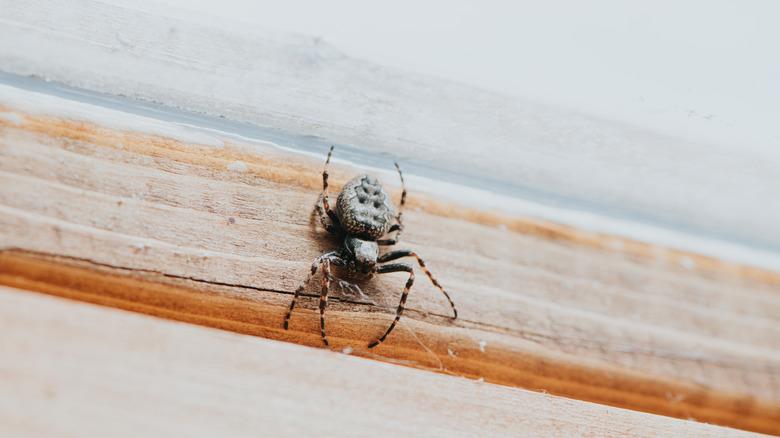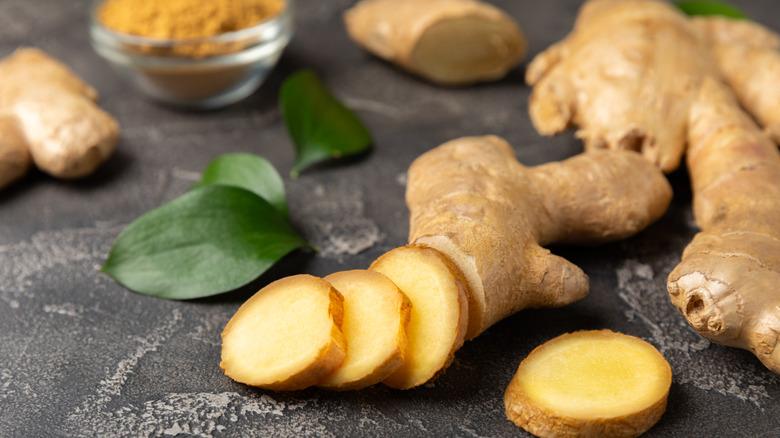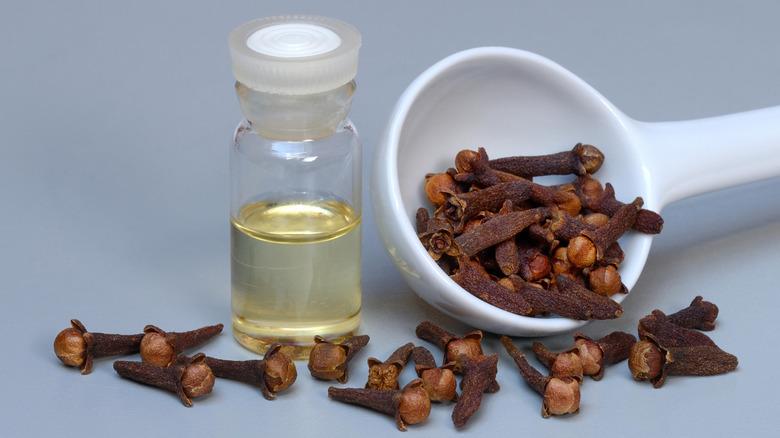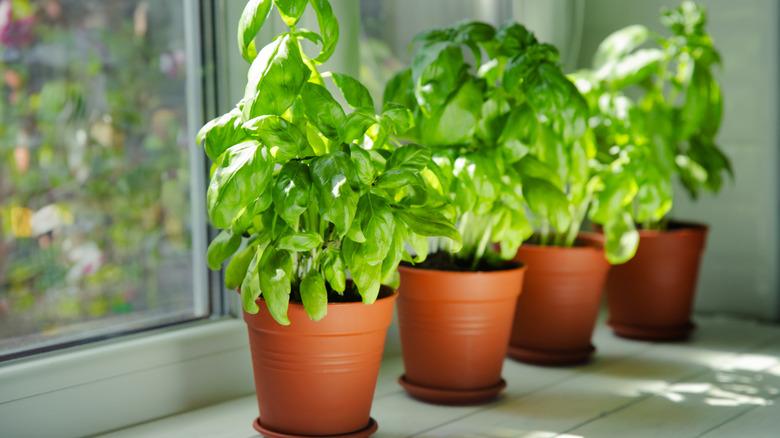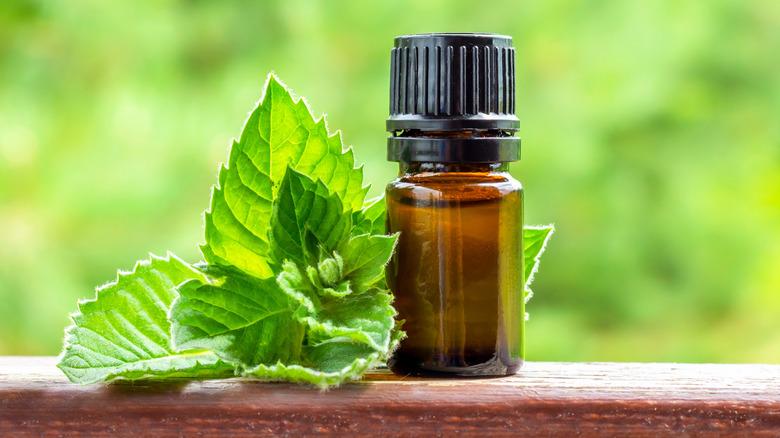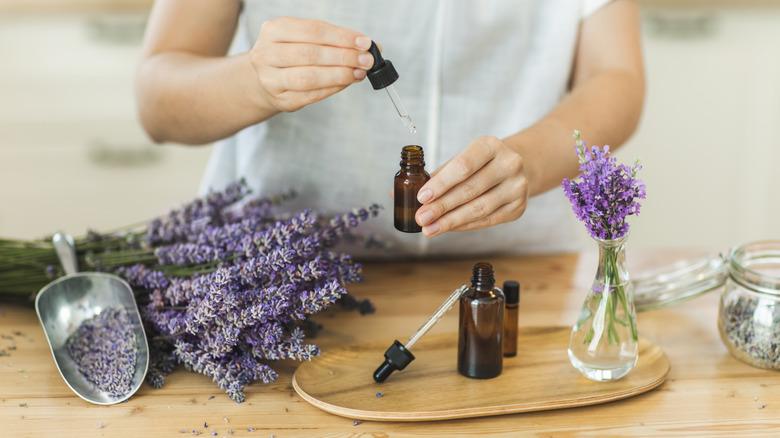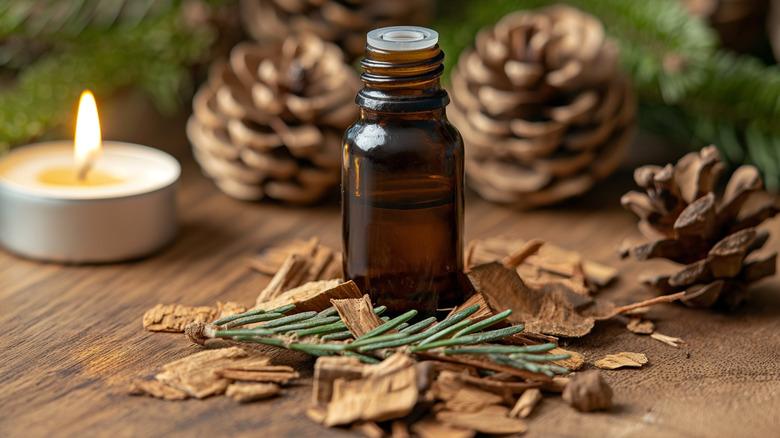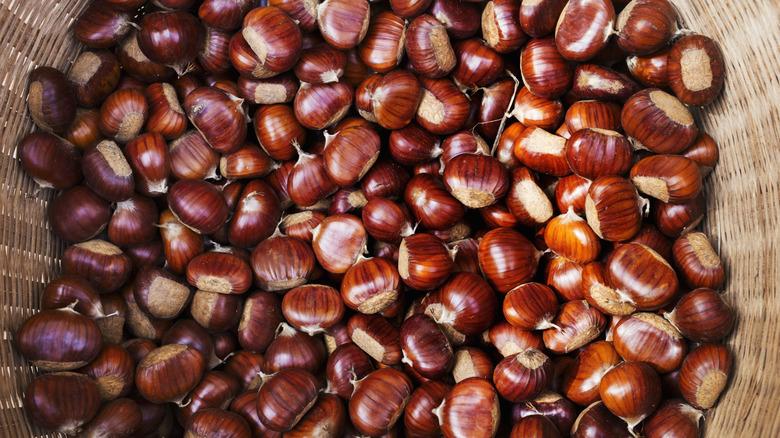Keep Spiders Out Of The House With 12 Natural Scents They Can't Stand
Although spiders come with a few benefits, like eating other pests, most of us still don't want to see them crawling around our homes. While most of them are harmless, there are still a few species that are venomous and can be dangerous to have around. Plus, they leave behind unsightly webs that give you one more thing you have to clean. However, unless you're dealing with a potentially harmful species, there's no need to kill them. The best way to keep both your home and its four-legged intruders in check is by sending a clear message that they're not welcome. One of the most effective ways to do that? Use their powerful sense of smell to your advantage.
Despite their multiple eyes, these arachnids rely on their other senses to detect other predators and prey around them. They don't use noses to sniff, but instead, their sense of smell can come from sensory organs on their legs. That's why strongly scented plants, oils, and other products can be surprisingly effective at keeping them away. Even small amounts of strong scents can overwhelm a spider's senses, making it more challenging to detect where food is. While natural insecticides and pest-repelling solutions are generally safer around pets and children, it's important to note that some of the options below can be toxic, especially in high amounts. Before trying anything new, double-check with your vet or your child's pediatrician to make sure it's a safe fit for your household.
Pine-Sol
Pine-Sol is a common disinfecting cleaner that leaves behind a fresh, piney scent, but some people claim it does more than just clean. Many have noticed that it seems to deter spiders and other pests, though there's not much research to explain why it works. Although most of the ingredients aren't traditional spider repellents, the key likely lies in Pine-Sol's strong fragrance, which can be overwhelming to their sensitive nervous systems (though it's not scientifically proven to be a neurotoxic agent). The intense pine scent may also help to repel flies and other insects, so spiders have less reason to stick around if their food supply disappears. Most of the spider-repelling evidence for Pine-Sol itself is anecdotal, but some people swear by it. So, if you're cleaning anyway, it might be worth giving Pine-Sol a try.
To use Pine-Sol to repel spiders and insects, apply this disinfectant to surfaces like you usually would. You can clean with Pine-Sol nearly anywhere in your home with hard, nonporous surfaces, like floors, tile walls, garbage cans, and other areas where spiders and insects tend to hang out. For added impact, you can also use a diluted pine oil spray to further help repel insects that spiders feed on. The American College of Healthcare Sciences recommends using pine oil as a mosquito deterrent, which is one of the favorite foods of spiders.
Ginger
Between its unique flavor and health benefits, there isn't much ginger can't do, and now we're learning more about its ability to keep spiders out of the house. According to a 2022 study published in the Journal of Economic Entomology, ginger essential oil seemed to discourage spiders from building their web homes, hinting at its potential to be an effective natural repellent. Without wanting to set up shop, they're less likely to want to stay for the long haul. Additionally, studies have found that extracts from ginger, especially its bioactive compounds like gingerol, shogaol, and zingiberene, can repel or kill a slew of pests. Not only can you use ginger as a mosquito repellent, but you can also use this aromatic rhizome to keep out other pests like aphids, beetles, and cockroaches.
If you want to use ginger to keep spiders out, add 10 to 15 drops of ginger oil for every ounce of water in a spray bottle and give it a gentle shake. Because oil and water naturally separate, a dispersing agent, like Solubol, can help the oil mix better. Use this spray in any areas of the home where you've noticed spider activity, especially in corners, crevices, or other web-prone spots. You can also use it around your home or garden to target other pests, eliminating the spider meals in the process.
Clove
There are a number of ways to use essential oils, but did you know you can use clove oil for pest control? Its active ingredient, eugenol, kills flies, wasps, beetles, aphids, and numerous other bugs, whether they ingest it or come into contact with it. Because of its pest-fighting properties, eugenol is used in some pesticides and has been shown to help control other arachnids, like mites and ticks. Even more compelling, clove oil was one of the most effective essential oils tested against the northern yellow sac spider in a recent 2022 study.
Add 10 to 15 drops for each ounce of water to a spray bottle and keep it on hand to control insects that may attract spiders. Spray it near windows, doorways, or any other areas you've seen spiders enter the home. Alternatively, add a few drops of clove oil to cotton balls and leave them anywhere you've noticed spiders hanging around. Because the smell of cloves deters spiders, it may even be worthwhile to plant a clove tree outdoors if you have the space. When their fragrant flowers aren't in bloom, all you'll need to do is crush a few leaves; they'll release their essential oils and emit the clove scent.
Basil
Basil may look like a bunch of regular green leaves, but anyone who spends time in the kitchen knows the power they have to take an ordinary meal into a spectacular one. In addition to its culinary magic, it may be the key to your spider issues. The oil in this herb contains high amounts of linalool, a compound known to repel spiders and insects by interfering with their nervous systems. In fact, this substance is registered with the EPA as a minimum-risk pesticide, meaning it's both effective and safe for use around the house. That said, basil oil itself is extremely concentrated and should be kept away from any pets and young children.
If you've noticed spiders entering through your kitchen, consider starting an herb container garden on the windowsill. Having fresh, fragrant basil will emit a pleasant aroma for you and your family while deterring spiders from sneaking in through the window. Plus, there's nothing like having homegrown herbs ready to add to your favorite recipes. Basil is a great herb to add to your outdoor garden as well, especially if you've noticed eight-legged intruders creeping around your patio. As a bonus, its strong fragrance will also keep flies, aphids, mosquitoes, mites, and other pests away. Planting it near doors or other entrances can help keep them from sneaking inside, too. Alternatively, you can use a basil essential oil to mix into a spray, similar to how you would with clove or ginger oil.
Peppermint
You can grow mint plants if you want to deter spiders or insects from getting on your property, specifically peppermint. A 2017 study published in a journal by the Entomological Society of America tested three common spider-repelling substances on three different types of spiders. They found that peppermint strongly repelled two spider families, making it a promising natural deterrent. It's unclear why these creatures were so hesitant to come near the oil, but the main theory is that peppermint's menthol aroma is overwhelming and unpleasant to them, especially if they walk through it. As a bonus, mosquitoes aren't a fan of this scent either.
Peppermint is a refreshing fragrance that most don't mind smelling around the house, especially during the holiday season. However, you don't need to be celebrating to light a mint-scented candle. Place a few peppermint oil-infused soy candles around windowsills or entry tables to fill the area with the menthol aroma. Alternatively, add a few drops of the oil to an essential oil diffuser to fill the air with the spider-repelling scent. Your home will smell amazing to humans, but spiders will want to walk the other way.
Lavender
Basil isn't the only plant that contains linalool; lavender is also packed with this pest-repelling substance. According to Paulding County Master Gardener Volunteer Phillip Prichard, at the University of Georgia's Cooperative Extension, lavender produces a strong, unpleasant aroma that keeps pests like flies, fleas, moths, and mosquitoes away. So, lavender is a double threat: it doesn't just send spiders running, but it also drives away bugs that would attract them to your property in the first place.
Because lavender is such a popular scent, you can easily find it in several forms, whether you want to use the essential oil or grow lavender in a pot. Dried lavender bundles are commonly sold at places like farmers' markets, grocery stores, or even local lavender farms, and they're perfect for placing around the home to keep pests out. Plus, the pretty purple flower spikes look beautiful in vases or jars, hung upside down, or arranged into a front door wreath. If you want to grow it yourself, lavender is a low-maintenance plant you can easily add to containers to keep around your doors, windows, and other areas where spiders may sneak in.
Eucalyptus
Eucalyptus is another calming fragrance that's commonly added to aromatherapy products like candles, incense sticks, and soaps, but spiders don't seem to understand the appeal. While there isn't much scientific evidence on eucalyptus as a spider repellent, anecdotal evidence suggests that many pests, including spiders, dislike it. One reason could be its aromatic compound, cineole, which may be able to disrupt spiders' sensory receptors. When their ability to detect prey is thrown off, they're more likely to seek out hunting grounds where their senses aren't so overwhelmed. Others theorize they simply don't like the powerful menthol scent and want to avoid it.
Like lavender, dried eucalyptus is easy to find and adds a naturally fresh fragrance to your space, one that just so happens to double as a spider repellent. You can hang bunches in the shower, tuck a few sprigs into a vase, or use the essential oil in a diffuser. A few drops mixed into a spray bottle also work great for targeting corners or entry points where spiders tend to sneak in.
Cedarwood
Cedarwood is a somewhat uncommon fragrance in the world of aromatherapy, but there are plenty of those who love it for its earthy, comforting fragrance. Unfortunately for spiders, this scent doesn't make them feel at home. While there's limited research on cedarwood's effect on spiders specifically, it's a widely used oil in pest control products, and its compound cedrol is shown to repel other arachnids, like ticks and mites. The strong, woody aroma is thought to interfere with their sensory receptors, making it harder for them to navigate or hunt.
It's not just cedarwood oil that repels spiders; fresh cedar wood will also do the trick. One of the easiest ways to repel spiders using this scent is to add cedar blocks around the home, especially near doorways, baseboards, windows, and anywhere else you've spotted spiders. These little wood chunks are aromatic longer than many sprays or diffusers, making them a great option that keeps you from constantly spraying. However, like other essential oils, you can also mix cedarwood oil into water to create a spray for trickier areas. As a bonus, cedarwood is also an EPA-registered pesticide to get rid of moths in the home. So, you can eliminate two home pests with one pleasant fragrance.
Chestnut
The science community is a bit torn on whether chestnuts are actually worth it for those who want to evict spiders from their homes. The same study that tested peppermint oil for spider-repelling properties found that out of the three spider species tested, two showed strong aversion, while the third was somewhat hesitant. It is possible that these nuts contain toxic chemicals that the eight-legged pests steer clear of. Despite the evidence of the study, some scientists aren't buying it. On the other end of the debate, they state that since spiders aren't a problem for these trees, there isn't a reason for the trees to produce chemicals to deter the arachnids. However, many arachnophobes now swear by placing horse chestnuts around their homes, claiming that this deterrent works beautifully.
You can find horse chestnuts at online retailers like Amazon and some nurseries. Even if they won't make every spider turn around and leave your home, they still look lovely in decorative bowls and jars. If you want to go all in, you can even plant a gorgeous chestnut tree in your yard. Not only does it make a stunning shade tree, but it could provide you with regular ammo against spiders. Plus, some people claim it's actually the wood, not the nuts, that spiders don't like.
Garlic
If it's true that spiders despise strong smells, then it's no surprise garlic made the list. In fact, there's some evidence to suggest that garlic doesn't just repel spiders and vampires, but a wide range of other pests. Not only is it notoriously pungent, but it also contains allicin, a sulfur-rich, aromatic compound that is toxic to several insects, like house flies and mosquitoes. There's also evidence that points to its efficacy in managing other arachnids, like red spider mites (which are not the same as spiders). While most of the evidence of using garlic to get rid of spiders is anecdotal, we at least know it's useful in eliminating some of their favorite bugs to eat. Because the smell is so intense, there's also a good chance it irritates a spider's sensory organs, similar to other fragrant repellents.
Crush up some garlic to release the allicin and make it fragrant. Add it to a spray bottle with water and let it sit for a day, allowing the mixture to steep and strengthen. Once ready, spray it in areas where you've seen spiders run by or build webs. The smell might be intense for you, too, but that just means it's working. Because it works well to eliminate mites and other garden pests, use it in your garden to save your plants while nixing their food source out there, too.
Vinegar
Using vinegar to control spiders is another approach that has experts divided. The idea is that the acetic acid in white vinegar has a strong odor and mild corrosive properties, so spraying it around the home or directly on spiders will either repel them or harm them. However, when it comes to scientific studies, direct research on vinegar's spider-repellent properties is limited. Although acetic acid can be harmful to spiders in high concentrations, experts explain that household vinegar doesn't have enough of it to be effective. On the other hand, there's a lot of anecdotal evidence on pest websites, in forums, blogs, and social media where homeowners and experts report positive experiences using vinegar to repel spiders.
While there isn't a ton of research backing vinegar as a spider repellent, it's cheap, and most of us have it in our pantries, so it's worth giving a try. Mix equal parts vinegar and water in a spray bottle and spray in any areas you've seen spiders, along with cracks and entry points around the home. This mixture doubles as a homemade vinegar cleaning solution, so use it to wipe down surfaces to clean while covering more area to keep spiders out. Many TikTokers also recommend doubling up repellents by adding 5 to 20 drops of peppermint oil to the vinegar water.
Mustard
Perhaps the most surprising spider repellent, there's some new research that suggests that foods like mustard have some serious spider-repelling abilities. Whether it's the scent, taste, or spiciness, experts found that spiders had a strong aversion to mustard, wasabi, and other foods containing a compound called allyl isothiocyanate (AITC). When a group of neuroscientists at Wake Forest University painted the legs of wolf spiders with a food containing this ingredient, the spiders frantically went to work scrubbing it off themselves. One spider even dropped a cricket mid-meal after realizing it had been dipped in AITC. While researchers are just beginning to uncover why spiders react so strongly to this compound, early findings suggest there's something about it they seriously can't stand.
If you don't want to cover your home in mustard, you can easily make mustard oil with just a few ingredients. Grind mustard seeds and mix with warm water to release the spider-repelling compound. Let it steep, then strain the liquid and pour it into a spray bottle. If you don't want to make your own, you can find pre-made mustard oil that's ready to go. Spray the mixture on baseboards, around entry points, or other spider-prone areas of your home.
